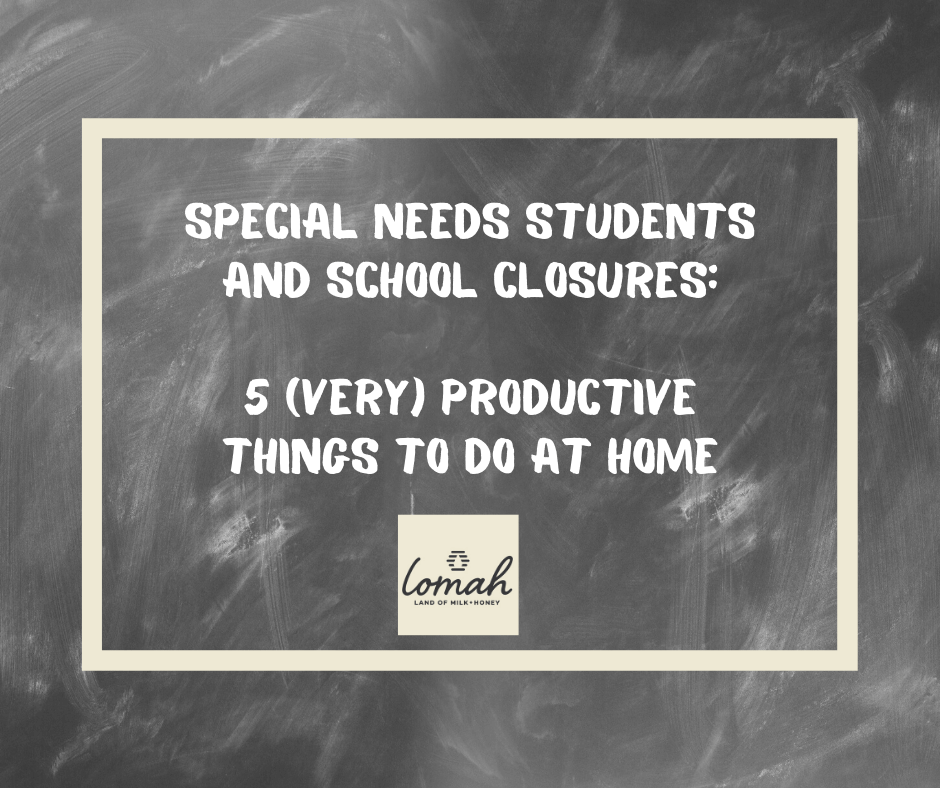Special Needs Students and School Closures: 5 Productive Things to Do at Home
Whether it be Covid 19, a snow day, holiday or summer break, there are going to be times when parents are reminded of the great work being done by our child’s special education team and therapists.
The baton has just been handed to you. Now what?
How do you fill their day?
How do you prevent regression?
How do you maintain your self care?
My daughter receives special education services for her non verbal type 3 autism, hypotonia, seizures, and intellectual disability. At school, she has a 1:1 aid and requires full assistance for her self care needs. For the last 6 months, she has had to be with me at home while we work through her school placement with the district.
The baton was placed in my hand and we have been running with it officially for 6 months and unofficially for 12 months. Surprisingly, this time has been one of not just surviving but thriving.
Here are 5 suggestions of things to consider doing with your special needs student while home:
1) Work on Prompt Fading and Self Help Skills
Our school days started with a 30 minute mad rush out the door filled with physical prompts and very little opportunities for my daughter to practice self help skills. With her education being at home, we now have ample time before the “bell rings”. The 5 minute “hurry up and eat your breakfast” is now her choosing her food and helping prepare and clean up. Likewise, it took months but she can also now make her bed unprompted and independently brush her teeth with visual prompts. All of this takes 2 hours and that’s okay. We now have the time and it is time well spent.
Resources:
LOMAH Podcast 92 discusses self care and prompting.
Procedures for Prompt Fading from The Autism Helper
2) Learn Their Communication System and Literacy Curriculum
If I could rewind the clock 10 years, I would have learned how to “speak AAC” sooner. Some speak English as their native language. Some may speak French. My daughter speaks AAC. Flipping my mindset to seeing her communication generating device as her native language was a game changer. Most of us learned our native language because it was spoken to us and modeled by others. When I began doing the same with my daughter's device, her ability to speak AAC took off. Now is a good time to sit with your child and his/her communication system and become fluent so you speak his/her native language.
Literacy will enhance any existing communication. It opens avenues for alternative means of both receiving and delivering information. Also, like communication and acquisition of language, reading is best learned when parents take an active role and don’t leave it completely up to others. Ask your child’s teacher for ways you can support literacy development at home and just get in there and do it. You will be surprised how quickly your comfort level increases. Reading to and with your child also pairs well with modeling AAC language, a win/win.
Resources:
LOMAH Podcast Episode 48 - Augmentative and Alternative Communication with Guest Racheal Langley, SLP
LOMAH Podcast Episodes 49 & 50 - Staying Person Centered with AAC w Guest Erin Sheldon
PrACCtical AAC Website is filled with best AAC practices and ideas
Tarheal Reader is an online library of simple, adaptable books for early readers to practice reading. They also allow people to create books.
Teachers Pay Teachers offer downloadable lessons created by teachers.
3) Do One Challenging Task Per Day
When in school, teachers and therapists are challenging our kids to meet new goals and navigate new environments. They often are placed out of their comfort zones with the result being growth in a specific area. While not fun at the time, rewards come later.
I have found when my daughter is challenged the moment is difficult but once complete she is aware of a job well done. For her, our daily challenge comes in the form of a 60-90 minute walk. Her hypotonia and autism make this an activity she tries to escape but oddly enough, when followed through it makes for a better rest of the day than when we skip the daily challenge.
Resources:
LOMAH Podcast Episode 75 - Physical Fitness in the Special Needs Community w Guest Ryan Lockard
4) Have a (Flexible) Schedule and Promote Self Advocacy
School is a very structured environment with schedules that must be followed. I have not found it necessary to keep strict time blocks, but do need to treat the day with structure and enough respect to take me out of my PJ’s. Typically, I know what we are going to do, just not how long it will take. If the morning routine takes more than 2 hours because we are being patient while fading prompts, then so be it. However, having a predictable order to the day is helpful and our kids are accustomed to schedules. Do make the schedule visible for your child either in print or digitally. We use the Choice Works app and allow our daughter to choose the order of her day. The first time she tried to rearrange the order I found myself pushing back only to realize what a great self advocate she was being. Being home offers the flexibility for her to choose and is a great time to work on self advocacy skills.
Resources
LOMAH Podcast Episode 69 - Self Determination with Complex Communication Needs w Guest Erin Sheldon
LOMAH Podcast Episode 52 - Curated and Reviewed Apps for Students with Special Needs
30 Free Printable Schedules for Home and Daily Routines from Lisa Lightner of A Day in Our Shoes
5) FOR YOU - Stay Emotionally, Spiritually, and Physically Healthy
Truth be told, this should go at the top of the list rather than the bottom. It’s tough when you have just lost 8 hours. Look at all 3 areas of health and put them in the schedule. Self care is in my schedule every day right out of the gates with a 45 minute morning walk. Physical Health, check. While on this walk, I use an app to have scripture read to me and spend time in prayer. Spiritual Health, check. My emotional health comes in tiny things throughout the day such as great music playlists, essential oils, fresh flowers, great coffee, quick texts to friends, and (my own) noise canceling headphones.
Resources:
75 Tiny Things to Bring Peace Amidst the Chaos - Downloadable by Mary Susan McConnell
LOMAH Podcast Episode 74 - Caregiver Emotional and Mental Health
LOMAH Podcast Episode 51 - Aching Joy with Jason Hague
LOMAH Podcast Episode 81 - When your Faith Feels Fragile with Diane Dokko Kim
LOMAH Podcast Episode 76 - Caregiver Physical Health with guest Betsy McNally Laouar
Be confident in your capabilities to carry the baton. Be SO confident! This is a unique opportunity that doesn’t come around often. I have found the last 6 months to be invaluable and know when I hand the baton back my ability to contribute to team discussions will have expanded in new areas.
You’ve got this!
Kim is the host of The LOMAH Special Needs Podcast which is an award winning show that takes an in depth look at topics relevant to raising our special needs children. The show runs topical series deep diving into an issue for 10-12 episodes with expert guests. 12 episode topical series have included education, safety, advocacy, inclusion, technology, housing, health, and more with over 100 episodes published.
For behind the scenes of the journey, find Kim on Instagram @journey2lomah or on Facebook as LOMAH



